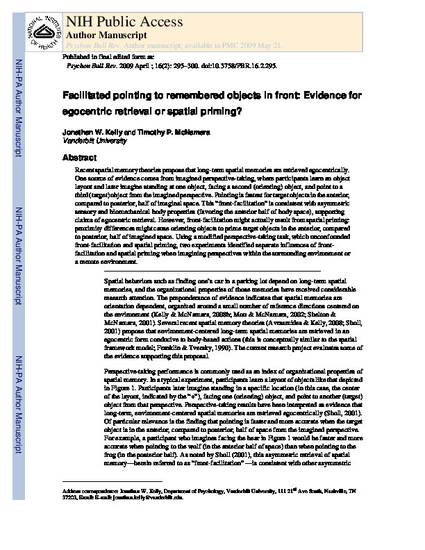
Article
Response mode differences in perspective taking: Differences in representation or differences in retrieval?
Memory & Cognition
(2008)
Abstract
Three experiments explored whether response mode differences in perspective taking result from different spatial representations or different retrieval processes. Participants learned object locations and then, while blindfolded, pointed to or verbally described object locations from perspectives aligned or misaligned with their facing direction and aligned or misaligned with the learning perspective. Pointing was facilitated from the perspective aligned with the body during testing. Similar facilitation occurred when verbally labeling, but only when conducted in the context of pointing (e.g., after pointing). Without this pointing context, or after third-person strategy instructions, the effect of body alignment was eliminated for verbal responses. Pointing was less responsive to context and strategy. Across all conditions, performance was facilitated for the learning perspective. Taken together, these experiments indicate that response mode differences are due to differences in the retrieval process, which varies with strategy, rather than differences in the organization of the underlying spatial memory.
Disciplines
Publication Date
2008
DOI
10.3758/MC.36.4.863
Publisher Statement
This is a manuscript of an article published as Kelly, J.W. & McNamara, T.P. (2008a). Response mode differences in perspective taking: Differences in representation or differences in retrieval? Memory & Cognition, 36(4), 863-872. doi:10.3758/MC.36.4.863. Posted with permission.
Citation Information
Jonathan W. Kelly and Timothy P. McNamara. "Response mode differences in perspective taking: Differences in representation or differences in retrieval?" Memory & Cognition Vol. 36 Iss. 4 (2008) p. 863 - 872 Available at: http://works.bepress.com/jonathan_kelly/24/
